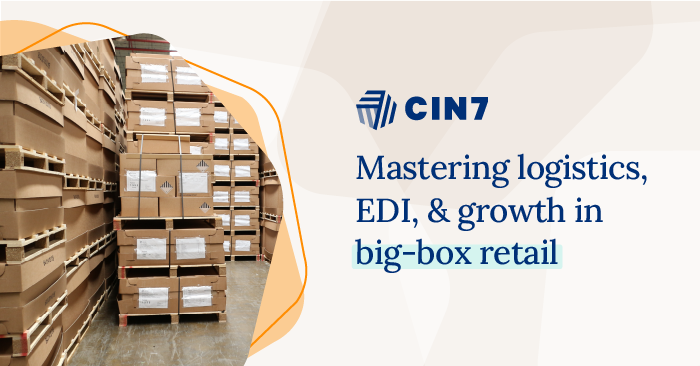
Imagine this scenario. A big-box retailer has offered you a dreamy deal, you’ve signed on the bottom line, and you’re ready to celebrate.
Not so fast.
Securing a contract with a big-name retailer—like Target, Walmart, or Kohl’s—is undoubtedly a massive accomplishment, but getting your foot in the door is just the beginning. To make the partnership a mutually successful one, you’ll need to meet the incredibly exacting and fast-moving expectations coming your way.
That’s why we’ve put together this comprehensive guide that will help you know how to set up your systems, optimize your fulfillment processes, and avoid potential pitfalls.
Understanding big-box retailer expectations
According to the Department of Energy, big-box retailers make up 82% of the retailer market. Their dominance can be attributed to their ability to supply a wide variety of products in a convenient location at consumer-friendly prices.
Because of their mass popularity and unmitigated success, big-box retailers have the upper hand when it comes to setting strict operational requirements, such as Must Arrive By Date (MABD) and On Time In Full (OTIF). MADB and OTIF require product sellers to abide by specific delivery schedules and to provide a certain percentage of shipments on time and in full. Additionally, many big-box retailers establish strict communication standards, specific packaging guidelines, and even definite Electronic Data Interchange (EDI) platform requirements–which is not surprising since EDI is how businesses keep information flowing freely between suppliers and ensure their shelves remain stocked.
The minute you sign the contract with your big-box retailer partner you’re responsible for meeting their stringent requirements. Should you fail to fulfill any or all the retailer’s expectations, the retailer imposes chargebacks or financial penalties. Or worse, may terminate your contract.
Sound harsh? It shouldn’t.
Big-box retailers resell products from hundreds to thousands of vendors in multiple store locations. These rigorous standards ensure efficient, consistent service to their customers—customers who expect the products they want are available when they want them. And when big-box retailers continually meet customer expectations, they make a tidy profit—and so do you.
Meeting big-box retailer expectations
Let’s break down the EDI expectations, logistics requirements, and growth challenges you may face as a big-box supplier.
1. The role of EDI in big-box partnerships
EDI is an automated system that facilitates the exchange of business documents between the separate computer systems of partnering businesses. By converting data into the standard EDI format, documents (such as invoices, purchase orders, and shipping notices) are quickly and efficiently shared between two parties. This eliminates the slow and insecure communication methods, like fax and mail, and the automated exchange process reduces inevitable human error.
There are different types and methods of EDI, including using an EDI network provider, going with a hybrid EDI infrastructure, and opting for a fully managed EDI service. As a big-box retailer supplier, you may be required to implement the retailer’s EDI platform of choice.
Setting up the approved EDI platform is not difficult. The EDI vendor, such as CRSTL and SPS Commerce, typically handle the entire onboarding process—which includes providing hardware, software, data management, compliance, testing, and support—for you.
Once your EDI is live, you’re ready to begin transacting and complying with the big-box retailer, thus happily avoiding any potential non-compliance fines or even potentially the loss of the partnership altogether.
2. Logistics readiness
As you work towards EDI compliance, you should also be assessing your fulfillment capacity. Two vital questions to be asking yourself include, “Are we ready to handle bulk orders?” and “Can we meet tight shipping windows?”
If you’re ready and you can, then you’re off to a fabulous start. If you aren’t and you can’t, you may want to consider the benefits of utilizing a third-party logistics provider, commonly known as 3PL providers.
3PL providers are basically logistics genies. They not only store, manage, ship, and track your inventory for you, they also fulfill orders, handle supply chain challenges, and ensure your products get to the right place at the right time. Instead of pulling your hair out trying to manage incredibly complex logistics, your 3PL providers—like ShipBob, ShipMonk, and Amazon FBA—will do it for you, relieving your logistics stress and freeing you to focus on other, business-growing tasks.
3. Scaling operations
Speaking of growing your business, your contract with the big-box retailer has fast tracked your ability to take your business to the much-sought-after next level. But your growth may be checked if you’re unable to maintain high-quality, consistent inventory as your order volumes exponentially increase.
A strategy for maintaining inventory quality and consistency is to leverage modern technology, such as cloud-based inventory management software (IMS). With an IMS, you can track stock levels, manage orders, streamline your supply chain, automate your workflows, and monitor operational performance with robust reporting in one, comprehensive solution.
Keeping your inventory ship shape with IMS spurs operational growth, but you can also fuel your growth with an infusion of capital. You can cash in with invoice financing, which gives you access to accounts receivable capital; take advantage of term loans so that you can borrow large sums of money (with a fixed payment plan) to put towards a major investment or long-term growth projects; and up your flexibility with lines of credit, which gives you access to funds when you need it, paying interest only when you use it.
At Cin7, we offer full inventory control and embedded financing to our customers through Cin7 Capital.
Avoiding common pitfalls that come with big-box retailer expectations
Failing to meet retailer deadlines
This one’s a doozy. Failing to meet retailer deadlines is tantamount to breaking retailer law, but instead of getting jail time, you’ll either be fined or nixed from their supplier pool for good. It goes without saying that you—along with your 3PL partner, if you have one—must know the big-box retailer deadlines and ensure that you meet them every time.
Underestimating the resources needed for logistics and communication
It’s never in your best interest to underestimate anyone or any situation, and underestimating how you’ll supply your products to and communicate with a big-box retailer is no exception. Having the technology, partners, and workflows in place before the first deadline approaches is vital.
Mismanaging purchase orders
Mismanaging a purchase order (PO) is another major no-no. A PO is a formal document that specifies what and how many items a buyer would like to buy from a seller, when they want them, and at what price. The PO is then converted into a sales order (SO). When a PO is inaccurate or filled with errors, then the SO is too, and delays, fines, and legal issues may arise. To avoid this, you’ll need to implement a competent solution that aids in the creation, processing, and paying of your purchase and sales orders.
Additionally, your EDI platform will act as your communication hub for the purchase and sales process, which reiterates the importance of getting your EDI platform in line.
Tapping Cin7 to exceed big-box retailer expectations
Ultimately, meeting (and exceeding) big-box retailer expectations is more than possible, but it requires key operational changes and securing the right tools for the job. Luckily, you have everything you need—and more—with Cin7.
As an all-in-one IMS, Cin7 gives you real-time visibility into your inventory across systems, channels, marketplaces, and regions along with an automated inventory lifecycle for Connected Inventory Performance. Cin7’s order management system helps manage purchase and sales orders, while our native EDI is a full-service feature that has our team managing all technical requirements, including building out the two-way connection and performing all compliance testing.
Unlike competing legacy solutions, Cin7 is a scalable, efficient, and cost-effective platform that helps you simplify compliance and ensure a smooth, growing operation.
If you’ve secured a deal with a big-box retailer, you’re well past the thinking stage and fully immersed in the it’s-really-happening stage—and Cin7 is here to help. Contact us for a free demo today.
More from the blog
View All Posts
Cin7 Core or Omni: Which One Is Right for Your Business?
Read More
The Cin7 quick reference guide to inventory management
Read More


